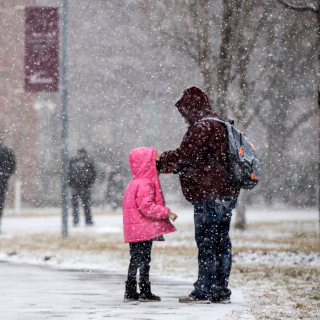Emotional Needs
Children of every age experience complex emotions, often communicating their needs to their caregivers. Children of all ages need to feel supported, loved, valued, accepted, and safe. Meeting children's emotional needs increase their resilience and helps them in building a strong foundation for future success in school, work, relationships, and throughout their life. When these needs go unmet, children can experience health complications, problems regulating and coping with emotions, and have general difficulty navigating relationships and day-to-day activities. A few challenges children can experience that limit their emotional, physical, social, and psychological health are Lack of Secure Attachment, Experiencing Grief and Loss, and Impacted by Trauma.
Attachment
The attachment bond between a child and their caregivers has an important impact on their relationships throughout life. Building secure attachment doesn't mean that caregivers have to be perfect, but that they must be responsive to the needs of their children. By understanding the attachment process, caregivers can ensure that their children form a secure attachment and have a healthy foundation for future relationships.
Virtual Resources
Websites
What is Secure Attachment and Bonding? Help Guide reviews the benefits of a secure attachment.
Our Voices: What are Attachment Disorders? Website by Attachment and Trauma Network.
Fear in Love: Attachment, Abuse, and the Developing Brain. Dana Foundation reviews the biological and neurological changes of trauma on babies, infants, and mothers.
Additional Readings
Fact sheets
What is attachment? Canadian Psychological Association fact sheet.
Strengthening Families: Nurturing and Attachment. A fact sheet from University of Florida.
Attachment. Parenting Counts info guide.
Articles
Why a Baby's Connection with a Parent Matters. The New York Times discusses why attachment matters.
The Different Types of Attachment Styles. Very Well Mind article.
The Keys to Rewarding Relationships: Secure Attachment. Psychology Today article.
Child Attachment. The British Journal of General Practice provides insight into childhood attachment and discusses the roles of professionals.
Books
Videos
Attachment’s impact on mental and physical health outcomes.
Dr. Allen Shore reviews attachment trauma and the impact on the brain.
Grief and Loss
Grief is a natural response to the loss of a relationship, a pet, or a loved one. Grief can also surface during times such as a divorce, loss of employment, or a child's removal from the home. Coping with grief can be complicated, and there is no right or wrong way to move through grief. Many believe grief can is resolved by ignoring it or just being strong enough to overcome it. Grief is not something we overcome; it something we increase our skills to cope with overtime.
Virtual Resources
Websites
Helping Someone Who's Grieving. Help Guides covers five tips for supporting someone who is grieving.
School and Community Toolkit: Teens. Journal activities and podcasts for teens dealing with grief.
Podcasts
Additional Readings
Fact sheets
My Grief Assistant. A collection of fact sheets covering tips and techniques for navigating over 40 types of grief and loss.
Coping with Loss. Parents & School brief.
Articles
5 Grief Myths About Children and Teens. Very Well Family article.
Supporting the Grieving Child and Family. American Academy of Pediatrics article.
Talking with Children about Death. Journal of Pediatric Health Care Article.
Books
Age-appropriate books about grief, loss, and death from Allina Health.
Videos
Institute for Social Change Reviews Best Practices for supporting children through grief.
Sesame Street in Communities episode, ‘When Families Grieve.’
Well Watch Cast reviews how to support someone coping with death.
Trauma
Children who experience trauma often demonstrate a range of physical, intellectual, and behavioral conditions that can compromise their success in school, at home, and in other social settings. To better meet the needs of children who have experienced trauma, professionals and caregivers are encouraged to learn more about and alter their response to traumatized children. Many schools and systems that serve youth are also working to become "trauma-informed." This shift in how we address the needs of traumatized children has been informed by data estimating that 10-20 % of children experience post-traumatic like symptoms following a single traumatic event and if left untreated, can result in health-related problems well into adulthood.
Virtual Resources
Websites
Recognizing and Treating Child Traumatic Stress. Substance Abuse and Mental Health Administration review types of trauma, signs, impact on children, treatment, and caregiver supports.
Children and Trauma. The American Psychological Association provides a brief overview of trauma and support tips for professionals.
Traumatic Experiences. Sesame Street provides articles, tips, and activities to support children who have experienced trauma.
Podcasts
In Social Work podcast, 'Trauma and Trauma-informed Care'.
Additional Readings
Fact sheets
Summary of the Adverse Childhood Experiences (ACES) study.
A Guide for Youth Understanding Trauma. Youth Move National guide.
Parenting a Child Who has Experienced Trauma. Child Welfare.gov tipsheet with age-appropriate trauma interventions for parents.
Articles
Building Resilience. Healthy Children hosts a library of articles on resilience after trauma.
Childhood Trauma’s Lasting Effects on Mental and Physical Health. Cleveland Clinic reviews the road to recovery for children after a traumatic event.
Books
Happily Ever Elephants recommended books on helping children deal with trauma, grief, and fear.
The Archibald Project recommended reading for families of a child with a trauma history.
Videos
Media Co-op explains how trauma impacts the brain.
TED talk by Nadine Burke Harris about the lifetime impacts of childhood trauma.
Twenty-five minute documentary about trauma and attachment.
